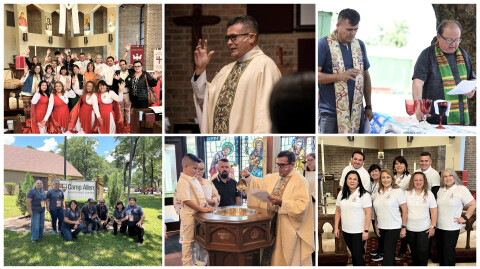“Now all the tax-collectors and sinners were coming near to listen to him. And the Pharisees and the scribes were grumbling… So he told them this parable: ‘There was a man who had two sons… he divided his property between them… the younger son… squandered his property in dissolute living. When he had spent everything… he went and hired himself out… to feed the pigs… when he came to himself he said, “How many of my father’s hired hands have bread enough and to spare… I will… go to my father… while he was still far off, his father… ran and put his arms around him and kissed him… the father said… let us eat and celebrate; for this son of mine was dead and is alive again; he was lost and is found!” And they began to celebrate.” (Luke 15:1-3, 11-24)
The parable of “The Prodigal Son” is one of the most beloved stories of Jesus. In it, we see themes of sin and repentance, forgiveness and grace, joy and belonging. Ultimately, the parable tells us what it means to be a child of God. Jeremias tells us, “The father is not God, but an earthly father; yet some of the expressions used are meant to reveal that in his love he is an image of God.”1 Commentators believe we have two different stories in this parable: the father and the younger son (11-24,) which we will review today, and the father and the elder son (25-32,) which we will review next week.
That a son would demand his inheritance while his father is still alive is an insult to the father. According to Levitical tradition, the eldest son would be entitled to a double share, which means that the youngest son would receive one third. Levitical law would have prevented the new owner to take possession of the land until the death of the father. “The son would have received slightly less than a third, due to the ongoing costs of running the estate.”2 The act of requesting one’s inheritance before a father dies would be like saying, “Father, I can’t wait around until you die. Give me my share so I can leave this place!” This highlights the lostness of the son.
The fact that the father complies with the young man’s request is a great act of love, which would have been misunderstood by most people in the village. The Wisdom of Ben Sirach (AKA, Sirach or Ecclesiasticus) states, “To son or wife, to brother or friend, do not give power over yourself, as long as you live; and do not give your property to another, in case you change your mind and must ask for it… For it is better that your children should ask from you than that you should look to the hand of your children… bring no stain upon your honor.” (33: 19-23.)
During this first story we also see the eldest brother’s apathy and neglect. It is customary in a Middle Eastern culture that the eldest brother intervene to be the reconciler between the father and younger children. Since such a request would have led to a break in relationship, and perhaps end with the severe punishment of the youngest son, it would be expected that the eldest mediate to bring the matter to a peaceful resolution. What we see instead is great apathy. The scene ends peacefully not because of the eldest’s intervention, but because of the father’s acceptance of an outlandish request. Through the sale of his inheritance, the youngest son is breaking away from the family, village, and culture. Since the identity of a Jewish person is so associated with the land and birth home, to sell them means to break from his known world and faith.
We then see the younger brother in a faraway territory, where he spends his wealth in a perpetual Mardi Gras party, until the money runs out, (a typical story in the New Orleans area!) To make matters worse, there was a severe famine in the land. This image of famine adds a dramatic element to the story that would have resonated with the original audience. The famine would have been a tragic event for a young man without a support system. Anyone with food in a time of famine would have had many beggars at the door, desperate for a job or some food. It was common to assign beggars to tasks they wouldn’t or couldn’t do. For a Jew to be sent to feed pigs would have been preposterous. No respectable Jew would sink that low. That this young man resorts to this shows that he was descending to a hell of unthinkable proportions.
The story tells us the young man wanted to fill his belly with the pods used to feed the pigs. These pods were widespread throughout the region.3 The phrase, “No one gave him anything,” indicates that even these wild, bitter berries were denied to him. The picture here is one of absolute lostness. The prodigal was starving to death. The passage tells us that he “came to his senses.” He remembered that even the lowest servant in his father’s home would have plenty to eat, while he was dying. He then hatches up a plan. He will return to his father, confess that he is not worthy of being called his son, and request that the father take him as a “hired servant.” There were three classes of servants: Slaves who were part of the estate, bonded servants who gave themselves into servitude to pay a debt, and hired servants. This class lived in the village and were assigned a salary. The young man’s plan was to be hired by the father and to be allowed to pay back what he took. This makes the father’s actions more astonishing.
The prodigal has three problems. He has broken his relationship with his father, he faces his brother’s wrath, and he fears the village’s anger for his colossal failure. By this point, however, he has reached rock bottom and he has no choice but to return. The story tells us that, unbeknown to the prodigal, his father had been praying and waiting for his return. In fact, as soon as he sees his son in the distance, the father runs to him. This behavior would have been scandalous. Sirach 19:30 states, “A man’s manner of walking tells you what he is.” The father knows the abuse to which his son will be exposed as he enters the village: He will be mocked, verbally abused, and subjected to ridicule. Some might even attempt to stone him. The father is willing to expose himself to ridicule (by running) to come to his son’s rescue.
As soon as the father reaches his son, he hugs him and kisses him repeatedly. The young man is so surprised by the father’s love that he only recites the first sentence of his prepared speech. He doesn’t say, “Make me as one of your hired servants.” His silence is an acceptance of his father’s grace. He gives up his idea of independence from his father, which means that he willingly chooses to work on his relationship with his father and his brother. He will have no other choice if he accepts his father’s plan. Now, he realizes that any new relationship must be a pure gift from his father. He can offer no solution. “I am unworthy” is now the only appropriate response.4
The father then orders his servants to plan a celebratory meal, “for this son of mine was dead and is alive again; he was lost and is found!” The best robe would most likely be the robe the father uses for special occasions. The witnessing of the son dressed in his father’s robe will have the effect of restoring the relationship of the prodigal to the community. The ring is most likely a signet ring, which means that the father has vested him with authority in regard to the entire household and in the eyes of the village. The wearing of sandals or shoes is a sign of a free-man who is superior to servants and slaves, most of whom would be either barefooted or wearing inexpensive hand-made lace sandals. Lastly, the father orders the killing of a fatted calf. These are young calves fed specially for grand occasions. That a calf is killed, rather than a sheep or a goat, means that the whole village has been invited to the party. The calf also points to the importance of the honored guest. The indication here is that the joy at finding the lost son is shared with the entire village. This, of course, advances the theological significance of the Lost Sheep and the Lost Coin. We move from celebration with neighbors to celebration with an entire village. The first part of the story ends with “And they began to celebrate.” Unfortunately, this is not the end. There is a key player who will determine much of what will happen next.
Next week, in our last installment in this series, we will review the story of the older brother and we will discuss the theological significance of the entire parable. Until then, I pray that you have a safe and enjoyable New Year’s Day with those you love,
Blessings,
Fr. Roman+
1 Jeremias, Joachim. Parables, 128. As quoted by Bailey, Poet and Peasant, 158.
2 As quoted by Forbes, Greg. “Repentance and Conflict in the Parable of the Lost Son (Luke 15:11-32).” JETS 42/2 (June 1999): 215.
3 Bailey, Poet and Peasant, 171.
4 Ibid., 183.





